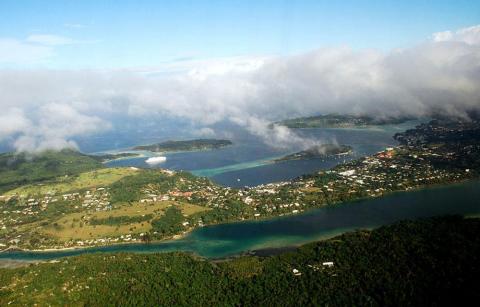
Promoting sustainable development through taxes and subsidies
Making taxes and public subsidies more “sustainable” is the challenge the Pacific Community has taken on as part of the RESCCUE project’s support for the development of innovative economic and financial solutions.
Potent drivers of both economic activities and consumer behaviour, taxes and subsidies can be used to promote sustainable development: in particular, they can help overcome existing funding shortfalls in climate change adaptation and biodiversity protection. RESCCUE recently launched a trial activity in that area.
A final report on Greening taxes and public subsidies in Pacific island countries and territories marked the close of that activity, carried out in partnership with the Institute for European Environmental Policy (IEEP) and Australian research agencies. The report focusses on three of RESCCUE’s pilot sites, i.e. those in Fiji, French Polynesia and Vanuatu. A similar but more in-depth study will soon be published for New Caledonia.
Taxes and subsidies involve a wide range of instruments such as direct and indirect taxes, tax exemptions, subsidies, Customs duty waivers, etc. They often provide important, and even vital, financial support to many of the region’s economic activities. Usually set up to pursue social and/or economic goals, their impact on the environment, both positive and negative, has generally been overlooked up to now.
This the case, for example, with mining in New Caledonia, where nickel ore extraction and processing, which benefit from extensive tax breaks, are one of the main causes for losses in land biodiversity, while at the same time being one of the main drivers of the economy and employment. In Vanuatu, many types of fishing gear are tax-free as support to that sector and this can have an impact on resources. Kerosene is also subject to exemptions in Vanuatu as support to household energy consumption and the same is true in Fiji, where draining wetlands for farming is still subsidised. In both French Polynesia and New Caledonia, there are a large number of tax breaks designed to facilitate urban and tourism development and they very often lead to building up the landscape, particularly right along the shoreline.
On the other hand, governments have introduced “green” incentives designed to help protect the environment.
Subsidies are allocated directly to organic farming in New Caledonia, to the development of single-dwelling solar panels in Vanuatu, or to waste sorting and recycling in French Polynesia. Hybrid vehicles imports in Fiji also benefit from Customs duty waivers.
It should be noted, however, that certain instruments, designed with the best of intentions, can have mixed environmental outcomes once they are in place, since the exact circumstances may completely alter their impact. For example, in most Pacific islands, once photovoltaic panels or electric /hybrid vehicle batteries have reached the end of their useful lifespans, they became a serious problem in terms of their collection and treatment.
The final report reviews nine economic sectors in all, i.e. mining, fisheries, agriculture, transport, waste management, water management, urban development, tourism, and energy. By identifying both good and bad practices in terms of financial instruments and subsidies, the document helps:
- gain recognition of the decisive effects that taxes and subsidies have on ecosystem protection and climate change resilience,
- share experiences in greening tax schemes and subsidies, and
- pave the way for reforms in that area.
An outcome of wide-ranging consultations and experience-sharing workshops with a variety of stakeholders (governments, civil society, public agencies, the private sector), the report provides an overview of the existing tax schemes and subsidies in each economic sector and suggests possible reforms to help make them greener. This analysis now needs to be transformed into concrete measures, something that only determined governments motivated by dynamic civil societies and private sectors can do.
Experience has shown that environmental reforms of taxes and subsidies require an in-depth analysis of the local situation, the involvement of the relevant sectoral departments, and a vigorous action and monitoring plan. Other means for action consist of designing measures to compensate for the reforms’ redistributive effects well upstream, or even specifically targeting those schemes that not only have negative impacts on the environment but have also strayed from their initial social and economic objectives.
The international timetable offers many useful reminders for the region’s governments. The Sustainable Development Goals, adopted in 2015 under the umbrella of the United Nations, do, in fact, include a goal for 2020 to “prohibit certain forms of fisheries subsidies which contribute to overcapacity and overfishing, eliminate subsidies that contribute to illegal, unreported and unregulated fishing and refrain from introducing new such subsidies” (ODD 14). In addition, in 2018 the Parties to the Convention on Biological Diversity (CDB) have to demonstrate implementation of their Aichi Objective no. 3 action plans. Since most countries are lagging behind, work needs to start now, and RESCCUE’s regional activity helps the countries involved find their places on the international agenda.
Background:
The purpose of the RESCCUE project (Restoration of Ecosystem Services and Adaptation to Climate Change), implemented by SPC, is to increase the resilience of Pacific Island countries and territories to global change.
*“By 2020, at the latest, incentives, including subsidies, harmful to biodiversity are eliminated, phased out or reformed in order to minimize or avoid negative impacts, and positive incentives for the conservation and sustainable use of biodiversity are developed and applied…”
Division
Climate Change and Environmental Sustainability (CCES)
RESCCUE
